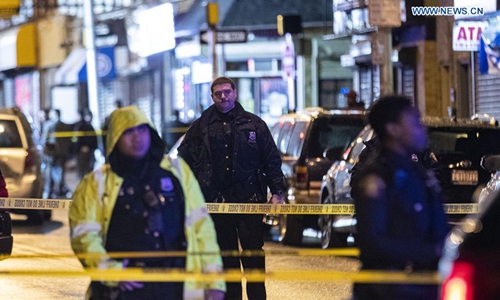HOME >> OPINION
US should stick to own human rights issues
By Yu Jincui Source:Global Times Published: 2019/12/11 21:28:40

Police cordon off a street near the scene of a shooting in Jersey City of New Jersey, the US, Dec. 10, 2019. Six people have died, including a police officer, three civilians and two suspects, in a shootout on Tuesday in Jersey City. Photo: Xinhua
When US senators, such as Marco Rubio, are busy finding fault with China's human rights record, the US is shrouded in sorrow and hopelessness that come from senseless gun violence killings.Throngs of heavily armed police officers, helicopters hovering overhead and the lasting sound of heavy gunfire - this was not a scene in some Hollywood blockbusters, but something real on the streets of Jersey City, New Jersey. In a sprawling gunfight on Tuesday afternoon that panned several blocks, hundreds of shots were fired and the gunfight lasted about one hour before police were able to gun down the suspects. Six people were killed, including one police officer and three civilians.
US President Donald Trump via Twitter called the incident "horrific." A sad reality is that horror created by gun violence has become ceaseless in the US.
Including Jersey City, there have been 10 US mass shootings in the first 10 days of December, bringing this year's total to 394, according to the Washington-based nonprofit Gun Violence Archive, which tracks every mass shooting in the US.
Gun violence has resulted in tens of thousands of deaths and injuries this year so far.
What has gone wrong with the US? Why, time and again, has gun violence occurred in the country? And why can't they control the reckless use of guns?
Gun violence has become a Gordian knot. Every time firearm violence tragedies take place, the US revisits the same cycle of partisan squabbling, heated social media debates and blame games, which ends with no sensible solutions. It requires American politicians' courage and will to cut the Gordian knot. Unfortunately, quite a lot of them apparently have shown greater interest in pointing an accusing finger at other countries' human rights records than minding their own country's business.
Senators, including Rubio, who accepted contributions from the National Rifle Association (NRA), one of the most influential lobby groups in the US, called for prayers for victims rather than action on gun control after a teenage gunman killed 17 people at a high school in Parkland, Florida last year. They infuriated the US public and were accused of attempting to curry favor with the NRA.
The power of the gun lobby and partisanship have helped derailed several attempts in Congress to pass tighter gun control measures. Under the existing system, it is impossible for the US to impose stricter gun regulations and effectively curb firearm violence. The violence in New Jersey won't be the last and US society will have to continue to suffer the pain caused by gun violence and the loss of innocent lives.
The US, which has positioned itself as a "human rights defender," has a flawed and lackluster human rights record. Rising gun violence, together with ingrained racial discrimination and increasing hate crimes, are all evidence of how the US has failed to protect people's right to life and right to equal treatment, exposing the hypocrisy of the US on human rights. What's worse, it seems the country now has neither the will nor the ability to solve those severe problems on its own territory.
Shouldn't US politicians care more about their own country's human rights development and work out a solution before putting their hands on countries at the other side of the Pacific?
RELATED ARTICLES:
Posted in: OBSERVER